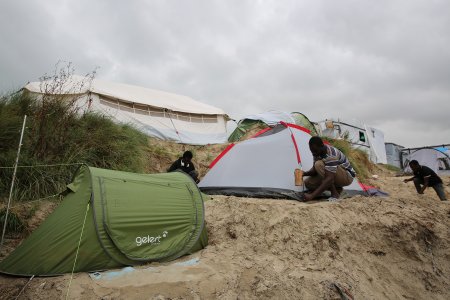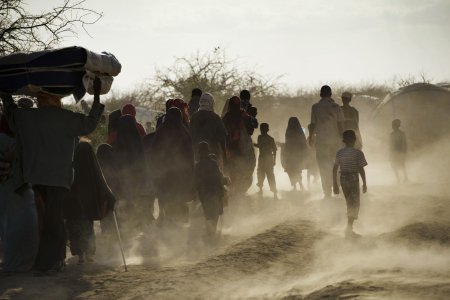Consultations on asylum and immigration bill: MSF denounces ‘‘a fool’s game”
Michaël Neuman

Director of studies at Crash / Médecins sans Frontières, Michaël Neuman graduated in Contemporary History and International Relations (University Paris-I). He joined Médecins sans Frontières in 1999 and has worked both on the ground (Balkans, Sudan, Caucasus, West Africa) and in headquarters (New York, Paris as deputy director responsible for programmes). He has also carried out research on issues of immigration and geopolitics. He is co-editor of "Humanitarian negotiations Revealed, the MSF experience" (London: Hurst and Co, 2011). He is also the co-editor of "Saving lives and staying alive. Humanitarian Security in the Age of Risk Management" (London: Hurst and Co, 2016).
The French authorities have been insistently and repeatedly claiming that they are open to dialogue on their asylum and immigration policy by inviting non-governmental organisations (NGOs) working with migrants and asylum seekers to meet and consult with them. The latest example is an invitation to meet with the prime minister and several members of the government on Thursday 11 January for a second “consultation with NGOs on the asylum and immigration bill”.
This meeting is only the latest in a series of multilateral and bilateral gatherings in which Médecins Sans Frontières (MSF) has participated to talk specifically about the situation in Libya. The meetings have been held with Interior Minister Gérard Collomb, Jacqueline Gourault, Minister attached to the Interior Minister, the Elysée Palace and even President Emmanuel Macron himself, who the MSF international president met with in New York during the most recent United Nations General Assembly.
On 21 December, we also went to Matignon for a meeting about the same draft bill, which was largely motivated by the government’s desire to defuse the controversy surrounding the conditional nature of emergency housing; this controversy arose when the government released its draft circular on 12 December. The previous meeting, held on 8 December, turned into a fiasco for Mr Collomb when the participating NGOs all walked out of the room in protest. The circular, calling for “mobile teams” to conduct a census in the emergency housing centres, sometimes even requiring the support of the organisations running them, is nevertheless now in effect. This is only the latest salvo of a policy that is sliding into harsh repression and that we know, from experience, will only make the migrants’ situation more precarious and dangerous.
After all these meetings, it has to be said that none of the government’s proposals convinced us that it is willing to change practices that we and others have been continually witnessing and that forcefully illustrate the violence committed against migrant populations and the intimidation practiced against organisations and citizens trying to help them.
Mr Macron did not respond when asked about the blatant and deadly contradiction between a statement condemning slavery (the least he could do!) on the one hand and the continued government collaboration with the Libyan coastguard and the de facto refoulement [forcible return] of migrants crossing the Mediterranean on the other. Nor did the government explain why it returned groups of young people to Italy who had crossed into France over the Briançon Alps without even giving them the slightest chance to request asylum. And although the courts have repeatedly condemned the State over the past two years for providing inadequate services to migrants in Calais, it has only done the bare minimum in response. Still worse, law enforcement continues to impede the work of relief workers and NGOs on a daily basis and to destroy the supplies, tarpaulins and blankets provided to the migrants.
What’s true in Calais is also true in the mountains, along the coasts and in city and town centres, where the police are encouraged to question and take into custody anyone determined to compensate for the State’s inadequate services. The public authorities’ denials and lies now vie with the violence committed by law enforcement.
For the time being, government officials have listened politely at best and shown condescension and contempt at worst in response to positions expressed in meetings, op-ed pieces published in the press and questions asked in meetings by NGOs, journalists and the Defender of Rights himself.
As a result, it is out of the question for us to participate in this fool’s game, which barely conceals the State’s desire to increasingly repress, expel and dissuade migrants at all costs instead of planning and organising ways to receive them in compliance with the law. We’re not closing the door on dialogue, but neither are we expecting anything from the discussions, which have nothing in common but their sterility. We’re waiting for the government to act.
This article was first published on Libération's website.
 Mohammad Ghannam
Op-ed
Mohammad Ghannam
Op-ed
Calais has become a cage in a jungle
06/17/2017 Michaël Neuman Corinne TorreIn this post, published in Border Criminologies, Michaël Neuman and Corinne Torre speak out against the inhuman conditions imposed on migrants and refugees in Calais by the French state. This piece was originally published in French in Le Monde.
 Lynsey Addario
Interview
Lynsey Addario
Interview
From Dadaab to Calais: what are the alternatives to the refugee camp?
11/18/2016 Rony Brauman Michaël NeumanMSF Crash's directors of studies, Rony Brauman and Michaël Neuman talk about MSF's refugee camp experience.
The Calais “jungle” today: France’s shame
12/05/2015 Anne Chatelain Michaël NeumanThis article was originally published in French in Slate Magazine on 4 December 2015, accessible here. The article was translated into English by Teresa Piacentini for the University of Glasgow GramNet blog.
To cite this content :
Michaël Neuman, “Consultations on asylum and immigration bill: MSF denounces ‘‘a fool’s game””, 12 janvier 2018, URL : https://msf-crash.org/en/camps-refugees-idps/consultations-asylum-and-immigration-bill-msf-denounces-fools-game
If you would like to comment on this article, you can find us on social media or contact us here:
ContributePériode
Newsletter
Subscribe to our newsletter to stay informed about our latest publications. Interested in a specific author or thematic? Subscribe to our email alerts.
